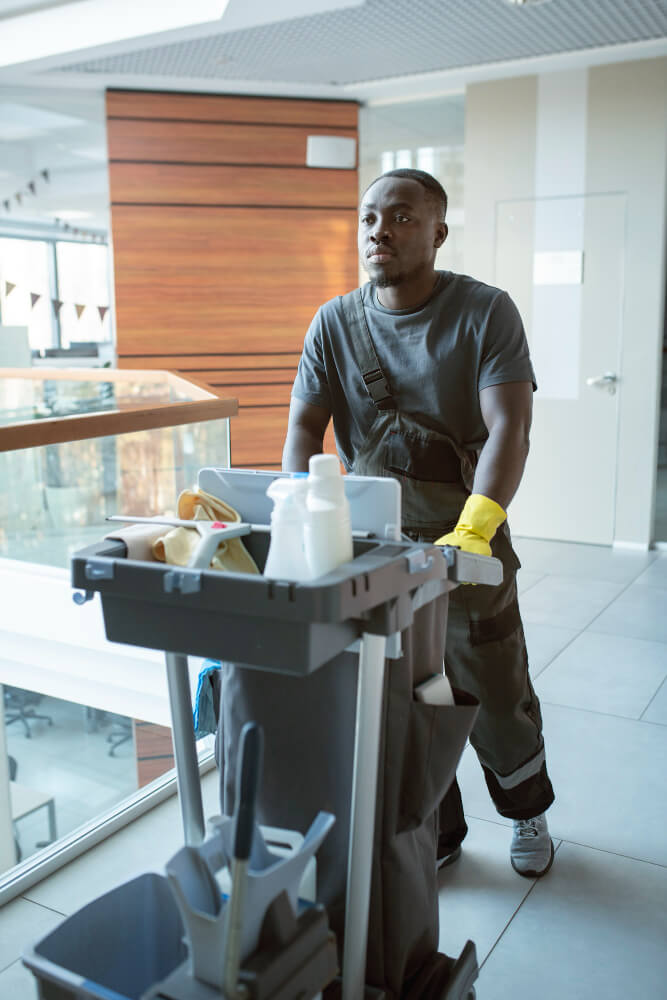In today’s world, where sustainability is a growing priority, businesses are looking for ways to reduce their environmental impact without compromising on hygiene standards.
Choosing eco-friendly commercial cleaning solutions is one of the easiest and most effective ways to do so.
If you’re based in Auckland and considering making this shift, you likely have questions like:
- Are eco-friendly cleaning products as effective as traditional ones?
- Will they cost more?
- How can I ensure my cleaning process is truly sustainable?
- Are there any local services or brands in Auckland that specialize in green cleaning?

Why Go Green with Commercial Cleaning?
Switching to eco-friendly cleaning solutions isn’t just a feel-good decision—it’s a practical one with tangible benefits for your business, employees, and the environment.
Healthier Workspaces
Traditional cleaning products often contain harsh chemicals like ammonia, bleach, and synthetic fragrances, which can cause respiratory issues, skin irritation, and allergies.
Eco-friendly alternatives use plant-based or naturally derived ingredients that are safer for both your cleaning staff and everyone who uses your workspace.
For example, a co-working space in central Auckland noticed a significant drop in complaints about strong chemical odors after switching to green cleaning products.
Employees reported fewer headaches and a more pleasant work environment overall.
Environmental Impact
Conventional cleaning products contribute to water and soil pollution when they’re washed down the drain, as many contain non-biodegradable or toxic ingredients.
Eco-friendly options are formulated to break down naturally and minimize harm to the environment.
Boosted Brand Image
Consumers and clients increasingly value businesses that prioritize sustainability.
Adopting eco-friendly practices, like green cleaning, demonstrates your commitment to reducing your environmental footprint and can set your brand apart in a competitive market.
Long-Term Savings
While some eco-friendly products might have a higher upfront cost, they often last longer and reduce waste, saving money in the long run.
For example, concentrated cleaning solutions that you dilute yourself can stretch further than ready-to-use options.
What to Look for in Eco-Friendly Cleaning Products
When browsing for cleaning solutions, you’ll find plenty of products claiming to be “green” or “natural.” To ensure you’re making a truly sustainable choice, keep these tips in mind:
Certifications Matter
Look for third-party certifications like:
- Environmental Choice New Zealand
- Green Seal
- EcoLogo
These marks ensure that the product meets strict environmental and health standards.
Ingredients to Avoid
Check the ingredient list and avoid:
- Bleach (sodium hypochlorite)
- Ammonia
- Phosphates
- Synthetic fragrances
Instead, look for plant-based ingredients like coconut-derived surfactants, essential oils, and natural solvents like vinegar or citric acid.
Packaging Counts
Choose products that use biodegradable, recyclable, or minimal packaging.
Some companies even offer refillable options to reduce plastic waste.
Local Products
Support Auckland-based or New Zealand-made brands that specialize in eco-friendly solutions.
Not only will this reduce the carbon footprint of shipping, but it also supports local businesses.
Practical Tips for Implementing Eco-Friendly Cleaning Practices
Switching to green cleaning doesn’t have to be overwhelming.
Start small and build up your eco-friendly routine over time.
Step 1: Audit Your Current Cleaning Routine
Take a close look at the products and methods you’re currently using.
Identify areas where you can make improvements, such as replacing single-use items or eliminating harsh chemicals.
Step 2: Start with Easy Swaps
Begin with small, impactful changes:
- Replace disposable wipes with reusable microfiber cloths.
- Opt for refillable spray bottles instead of single-use cleaners.
- Use eco-friendly dish soap and hand wash in shared kitchens and bathrooms.
Step 3: Train Your Staff
Your cleaning team plays a crucial role in maintaining sustainability.
Provide training on how to:
- Dilute concentrated eco-friendly products properly.
- Minimize water and energy use while cleaning.
- Separate waste for recycling or composting.
Step 4: DIY Green Cleaning Solutions
For simple tasks, you can create your own eco-friendly cleaners using pantry staples:
- All-Purpose Cleaner: Mix equal parts white vinegar and water. Add a few drops of essential oil for a pleasant scent.
- Glass Cleaner: Combine 1 part vinegar with 2 parts water and a splash of rubbing alcohol for streak-free results.
- Deodorizing Scrub: Mix baking soda with a few drops of water to create a paste.
Working with Eco-Friendly Cleaning Companies in Auckland
If you prefer to outsource your cleaning needs, partnering with a green cleaning company is a smart choice.
In Auckland, many commercial cleaning services now specialize in eco-friendly practices.
When evaluating potential partners, ask the following:
- Do they use certified eco-friendly cleaning products?
- What steps do they take to minimize waste and conserve water?
- Are their staff trained in sustainable cleaning methods?
- Can they provide references from other environmentally conscious clients?
Real-Life Examples of Green Cleaning in Action
Example 1: The Sustainable Café
A small café in Auckland made the switch to eco-friendly cleaning practices to align with its zero-waste philosophy.
They replaced harsh chemical degreasers with plant-based alternatives, started using reusable cleaning cloths, and trained staff on waste separation.
Customers loved the initiative, and the café saw an increase in loyalty from environmentally conscious patrons.
Example 2: Office Spaces Embracing Green Cleaning
A shared office space in Takapuna adopted green cleaning as part of its commitment to wellness.
They introduced air-purifying plants, switched to natural floor cleaners, and reduced single-use plastic by replacing disposable bin liners with compostable options.
Staff reported a noticeable improvement in indoor air quality and fewer complaints about allergies.

FAQs About Eco-Friendly Cleaning
How can I tell if a product is genuinely eco-friendly?
Look for certifications, check the ingredient list, and research the brand’s sustainability practices.
Be wary of “greenwashing,” where companies make vague or misleading claims about their products.
Are eco-friendly cleaning products as effective as traditional ones?
Yes! Many green products are specifically designed to tackle tough stains and dirt.
For heavy-duty tasks, look for concentrated formulas or tools like steam cleaners.
Can eco-friendly cleaning save money?
Absolutely. Reusable tools like microfiber cloths and concentrated cleaning solutions can reduce long-term costs.
Engage with Your Community
Your journey toward eco-friendly cleaning doesn’t have to be a solo effort.
Share your experiences with other businesses in Auckland and encourage a community-wide commitment to sustainability.
- Post tips and updates on social media.
- Collaborate with other businesses to source bulk eco-friendly products.
- Join local sustainability groups or initiatives to stay inspired.
Final Thoughts: A Cleaner Future for Auckland
Embracing eco-friendly commercial cleaning solutions is more than just a choice—it’s a responsibility.
By making the switch, you’re protecting the health of your employees, reducing environmental harm, and setting a positive example for others.
What’s holding you back from making the change? Share your thoughts in the comments below.
And if you’ve already started your green cleaning journey, let us know which tips or products worked best for you!
Together, we can make Auckland a cleaner, greener place for everyone.





